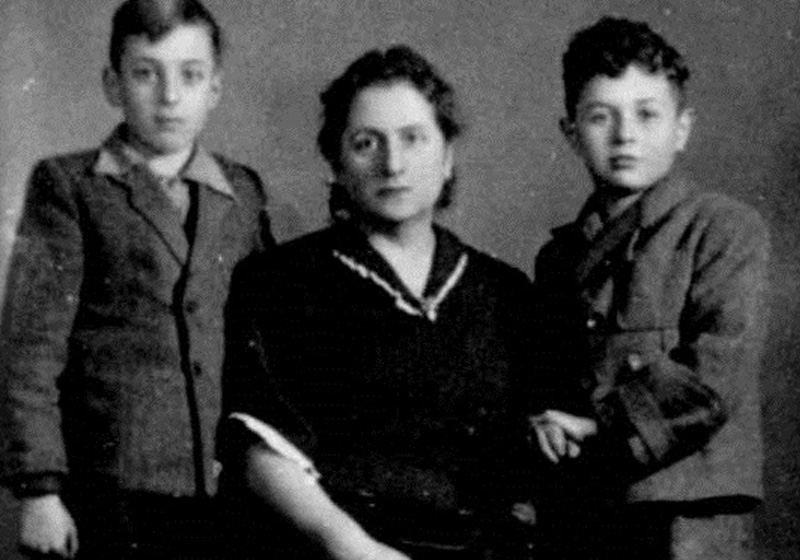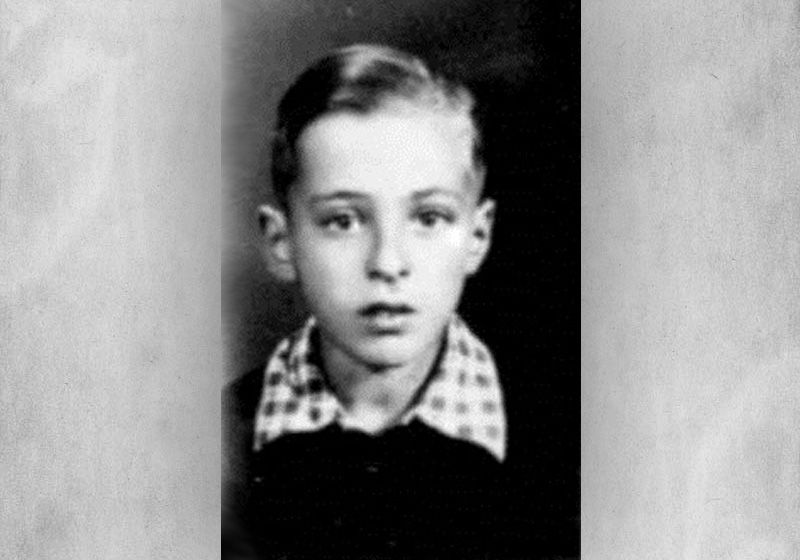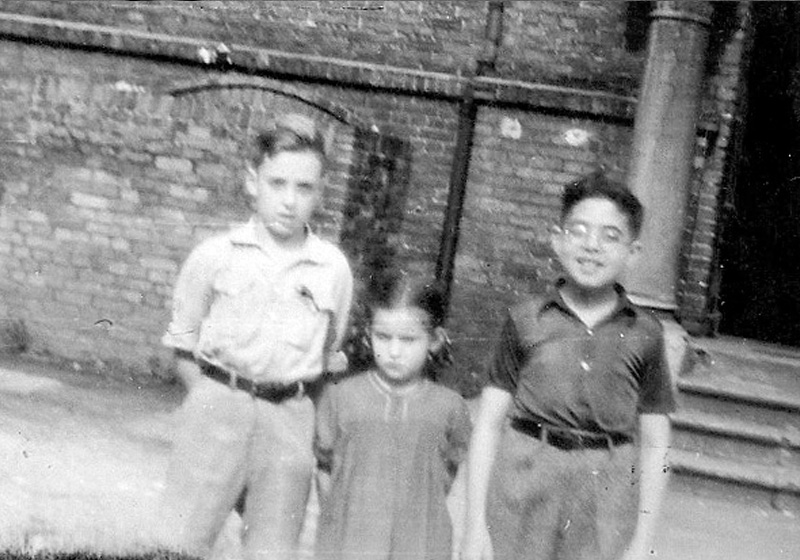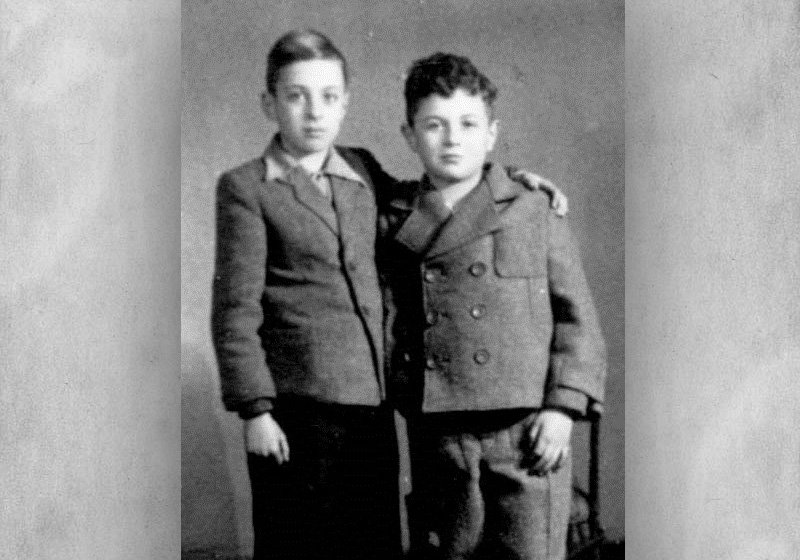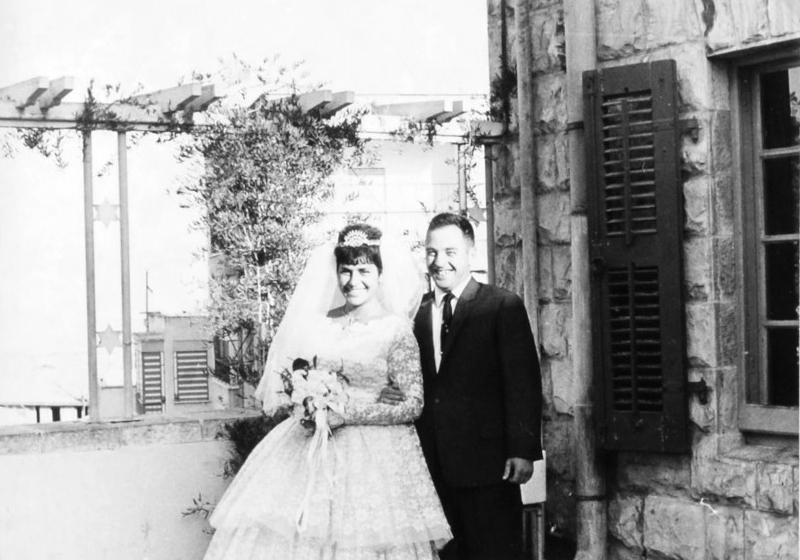Children's Homes for Holocaust Survivors
"My Lost Childhood"
Alfred Mazeh: A Young Boy at the Children's Home in Zabrze
Yishai, Helena and Alfred were confined in the Warsaw ghetto with the rest of the city's Jews. Alfred's parents managed to have him smuggled out of the ghetto in late 1942 or early 1943. In his testimony given to the Institute of Contemporary Jewry, Alfred describes parting from his parents, a memory he carried with him always:
We were in some house, I don't know how we got there. It was a corner house whose windows looked onto the Aryan side. The house bordered on the ghetto wall. It was a brick wall with glass shards at the top. … A woman I didn't know came. Mother told me that she had been my nanny when I was a little boy, but I didn't remember her. They gave this woman two suitcases. … In one of them was a set of spoons and forks. … The second one was filled with watches and all kinds of other things. What exactly, and if they gave [her] money I don't know. Mother told me that the woman was taking me, and that they would join me in a few days.
Five-year-old Alfred left with the woman via the ghetto gate. His assumed Polish name was Morazowski. The woman, who was a Volksdeutsche (ethnic German) told the guards at the gate that he was her son, and they let her leave. Alfred recalls:
Outwardly, I didn't look Jewish. I had blonde hair. My nose and eyes were not typically Jewish. I left, and as we walked in the street, I saw my mother at the window [on the ghetto side], looking. I wanted to wave to her but she [the woman] didn't let me, saying that there must be no sign of a connection between us. We passed the street corner and I never saw my parents again.
Alfred stayed with the woman for about six weeks. After that, she transferred him to a Polish family with a ten-year-old daughter and a seven-year-old son who bullied Alfred relentlessly. Alfred was repeatedly warned not to go near the window. Every time there was a knock at the door, he hid in a cupboard. Recalling his time with this family in April 1943, the period of the Warsaw Ghetto Uprising, Alfred says:
Suddenly I saw that burned pieces of paper were falling on the window ledge. One of the pieces wasn't entirely scorched, and there were letters on it. I knew how to read Polish; I didn't know how to read Hebrew, but those were probably Hebrew letters. … I turned around in the room, and heard the Polish woman telling a neighbor that now they were burning the Jews. After the woman went out, I went into the kitchen and asked her if it was true that they were burning the Jews. She told me that it wasn't true, they weren't burning everyone. … and that my parents would come to get me. … And after that the daughter came and because we were already on good terms, I asked her and she said, "They are burning all the Jews now, and your parents will not be coming. They're dead." I remember that I cried for several hours.
A few weeks later, Alfred was moved to another Polish woman's home, and from there to a young couple, the Borokowskis, where he stayed until the end of the war. At the Borokowskis, he didn't have to hide, and was free to play with children in the courtyard. In the summer of 1944, Alfred went with the couple on holiday to a farm in Gora Kalwaria. He knew that he could never expose his Jewish identity. He went to church with them, but was not baptized. About two days before the Warsaw Uprising erupted, the couple went out, leaving Alfred at the farm with Mrs. Borokowski's 17-year-old brother. Because of the fighting, the Borokowksis couldn't return, and the farm owner told Alfred and the teenager that they would have to work to earn their keep or else be thrown out. Alfred worked as a cowherd. Hunting down partisans, the Germans carried out a raid in the area. They seized the boys and brought them to a nearby camp. Alfred managed to escape back to the village, while the second boy joined the partisans. After the war, Mrs. Borokowski returned and brought both boys back to Warsaw. Alfred, who knew how to read and write, was placed in fourth grade at school, and completed the year at the top of his class.
One day, a Polish Army captain came to the door. Alfred was very taken with his uniform and gun. The captain was chaplain Yeshayahu Drucker, who had come to the Borokwskis to negotiate Alfred's return to the Jewish fold. Alfred did not suspect Drucker of being Jewish, and did not know his name. Alfred relates:
He [Drucker] spoke to the Polish woman. I don't know what they talked about. He visited twice, and I feared that nothing good would come of it. One day he came, and they said: "You completed fourth grade at the top of your class" – I was very proud of the report card I had brought home – "and they're going to send you to study in England." England – that was a dream come true. I was pretty naïve and I swallowed it "hook, line and sinker" as they say. They told me, "This man, Captain Drucker, will take you to England, and you'll come back in a few months' time."
Drucker took Alfred to an apartment in Warsaw, where they met with Rabbi David Kahane, Chief Polish Army Chaplain. On the second day, they told Alfred that he was Jewish. "I told them that I know I'm Jewish", he relates, "but I that I don't want to be Jewish. We had a long argument about why I didn't want to be Jewish. … I explained that it wasn't worth being Jewish because it wasn't in my best interests. Jews were hunted and beaten, and now I resembled a Pole, and didn't look at all like a Jew." Alfred concluded with the fact that his parents had died, and that he saw Mrs. Borokowski as his surrogate mother. He wanted to stay with her, and was not prepared to publicly admit that he was Jewish. The fact that he was Jewish bothered him. After three days together in Warsaw, Drucker brought Alfred to the children's home in Zabrze. Alfred recalls his first impressions of the place:
We entered the principal's room, where I saw pictures of Herzl and Bialik. Bialik I somehow stomached, but Herzl – his long beard did not appeal to me and I said to myself: this is a place for Jews. Before I had the chance to voice this, two girls around my age came in, who were very Jewish-looking. I said to myself: this is a bad place, I've landed amongst the Jews. They set me up.
Alfred wanted to return home to Warsaw, and made endless plans to that end. He assumed that Mrs. Borokowski was also looking for him. A few days after his arrival at Zabrze, Alfred persuaded one of the children to run away with him. They managed to reach Katowice, where they lacked the resources to continue on to Warsaw, a distance of over 300 km. The boys' disappearance discovered, the police were alerted, who found them sleeping on a bench at the Katowice railway station, and they were returned to the children's home. Alfred later understood that Drucker had persuaded Mrs. Borokowski to hand him over to his care, and paid her for sheltering him. Alfred started to acclimatize to his new reality. He attended the Polish school like all the children at the home, suffering on occasion from bullying by the local pupils. It was that maltreatment which actually awakened a feeling of affiliation to Judaism in Alfred. He relates:
I think that after a month or two, they convinced us that it was worthwhile being Jewish. I don't know how they did it, but a large part was presumably stories about Eretz Israel with all kinds of pictures. … I guess I had a romantic soul, and I began to grow enthusiastic, first about Eretz Israel and later about very fact of being Jewish.. . The catalyst for this Jewish awareness was the fact that we started learning at the Polish school. We were presented there as Jews from a Jewish children's home, and we had quite a few confrontations with all kinds of Polish children. We were forced to defend our nation's honor, and defend it we did.
In 1949, Alfred immigrated to Israel and reached Kibbutz Gan Shmuel. He left the kibbutz after his military service and joined the Zim merchant marines, from which he retired with the rank of third officer. In 1965, he married Iraqi-born Zemira, a qualified nurse at Rambam Hospital in Haifa. Alfred studied programming at the Technion Institute and was hired by Israeli Aerospace Industries. The couple had two daughters.
Remembering Yeshayahu Drucker, who removed him from Mrs. Borokowski's home, Alfred says:
Initially, in my anti-Jewish phase, he impressed me simply by being a soldier, endowed with that aura of a military man who fought the Germans. Later on, at the children's home, I believe that he gave me and my friends more attention than he gave the other kids. He looked after us better even though he was not a member of staff. He would come and go, and always had something for us in his pocket. We started to love and idolize him. Today of course, I realize that I owe this man everything. I owe him my Jewish identity, and the fact that I'm here – it's all thanks to him.
In 1985, Alfred Mazeh submitted Pages of Testimony to Yad Vashem in memory of his parents, Helena and Yishai. Alfred passed away in the year 2000.


